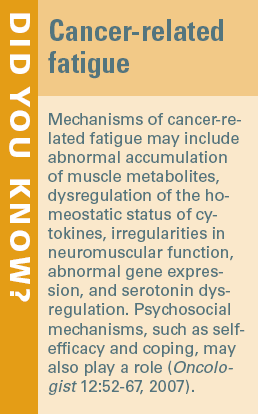Modafinil use curtails severe, treatment-related fatigue
About 80% of cancer patients undergoing chemotherapy, and 89% of those who undergo radiation therapy, experience fatigue during their treatment. But about 30% of cancer patients continue to feel fatigued for years aft er treatment. A phase III study demonstrated that the eugeroic agent modafinil (Provigil) reduces severe fatigue and sleepiness among cancer patients undergoing chemotherapy.
ABSTRACT: Sleepiness decreased, depression was unchanged by narcolepsy drug in this phase III trial.
About 80% of cancer patients undergoing chemotherapy, and 89% of those who undergo radiation therapy, experience fatigue during their treatment. But about 30% of cancer patients continue to feel fatigued for years after treatment. A phase III study demonstrated that the eugeroic agent modafinil (Provigil) reduces severe fatigue and sleepiness among cancer patients undergoing chemotherapy.
Gary R. Morrow, PhD, associate director for community research at the University of Rochester Cancer Center, led U2901, a randomized, double-blind phase III trial in cancer patients starting chemotherapy at affiliates of the center’s Community Clinical Oncology Program and who had a fatigue level exceeding 1 on the 10-point Brief Fatigue Inventory at baseline (cycle 2).
The 642 patients were assigned to daily placebo or 200 mg of modafinil, a drug that is currently approved for the treatment of narcolepsy and other sleeprelated conditions, and that has stimulatory properties but no peripheral effects or potential for addiction.
Treatment was started on the tenth day of chemotherapy cycle 2 and ended after the seventh day of cycle 4. Fatigue, sleepiness, and depression were assessed from patient reports, and differences between groups at cycle 4 were compared, adjusting for values at baseline, according to Dr. Morrow (ASCO 2008 abstract 9512).
The majority of the patients had breast or alimentary cancers. At baseline, 11% of the patients had mild fatigue (a score of 0-4 on the inventory), 17% had moderate fatigue (a score of 5 or 6), and 73% had severe fatigue (a score of 7-10).
At cycle 4, compared with their counterparts in the placebo group, patients in the modafinil group had significantly less sleepiness on the Epworth Sleepiness Scale (http://epworthsleepinessscale.com/).
This result provided reassurance that the drug does was adequate, Dr. Morrow said. In addition, the observed changes had a physiologic basis.
Modafinil significantly reduced fatigue relative to placebo in the trial population overall. Further analysis by the group indicated that the eff ect varied according to the baseline level of fatigue, Dr. Morrow reported.
Patients with severe fatigue had significantly less fatigue when treated with modafinil compared with placebo.
However, those with mild fatigue or moderate fatigue did not report any change in their status, he said.
Dealing with depression
Despite positive results in fatigue, modafinil had no effect on depression, suggesting that the latter condition will require separate treatment.
“The simple fact of the matter is that we don’t know what causes cancer-related fatigue any more than we know what causes fatigue in general,” Dr. Morrow said.

He cited research conducted by his team that showed the antidepressant paroxetine hydrochloride (Paxil) improved depression but did not alleviate fatigue, even in various subgroups (Breast Cancer Res Treat 89:243-249, 2005).
The trial’s findings have implications in terms of the etiology of cancer-related fatigue and its treatment, according to Dr. Morrow.
“Paxil changed depression but not fatigue. Modafi nil changed severe fatigue but not depression,” he commented. “Ergo, it is quite unlikely they are the same thing.”
The Vantage Point on this article can be found here:
Would a higher dose make a difference?
How Supportive Care Methods Can Improve Oncology Outcomes
Experts discussed supportive care and why it should be integrated into standard oncology care.
How Supportive Care Methods Can Improve Oncology Outcomes
Experts discussed supportive care and why it should be integrated into standard oncology care.
2 Commerce Drive
Cranbury, NJ 08512
All rights reserved.